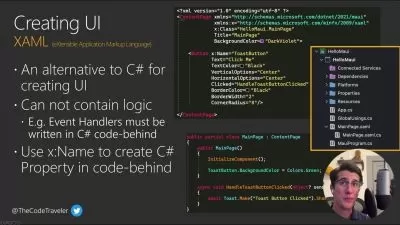Master SOLID Principles in C#: Clean Code Pro Guide
Focused View
2:07:32
1 -Introduction to the Course.mp4
03:15
2 -Overview of SOLID Principles.mp4
07:25
1 -What is Single Responsibility Principle.mp4
04:53
2 -Understanding and identifying SRP violation and fixing it - Code example.mp4
07:44
3 -Benefits of conforming to Single Responsibility Principle.mp4
03:17
1 -What is Open-Closed Principle.mp4
03:57
2 -Understanding and Identifying OCP violation and fixing it - Code example.mp4
13:57
3 -Benefits and importance of Open-Closed Principle.mp4
03:41
1 -What is Liskov Substitution Principle (LSP).mp4
03:55
2 -Understanding and Identifying LSP violation and fixing it - Code example.mp4
16:28
3 -Benefits and importance of Liskov Substitution Principle (LSP).mp4
05:47
1 -What is Interface Segregation Principle (ISP).mp4
05:12
2 -Understanding and Identifying ISP violation and fixing it - Code example.mp4
06:01
3 -Benefits and importance of Interface Segregation Principle (ISP).mp4
03:43
1 -What is Dependency Inversion Principle (DIP).mp4
09:48
2 -Understanding and Identifying DIP violation and fixing it - Code example.mp4
09:15
3 -More Topics closely related to DIP.mp4
11:08
4 -Benefits and importance of Dependency Inversion Principle (DIP).mp4
04:27
1 -Summary and what next.mp4
03:39
More details
Course Overview
Master SOLID principles using C# to write maintainable, scalable, and robust code through practical examples and real-world applications.
What You'll Learn
- Understand and apply all five SOLID principles (SRP, OCP, LSP, ISP, DIP) in software design
- Refactor and improve existing codebases for better readability and reduced technical debt
- Design adaptable software systems that handle changing requirements with minimal impact
Who This Is For
- Aspiring software developers looking to build strong design foundations
- Experienced developers seeking to improve their design skills
- Software architects and team leads designing maintainable systems
Key Benefits
- Create clean, maintainable code that stands the test of time
- Develop modular components for efficient reuse across projects
- Gain skills that promote long-term project success and scalability
Curriculum Highlights
- Single Responsibility Principle (SRP) with practical examples
- Open-Closed Principle (OCP) implementation techniques
- Liskov Substitution Principle (LSP) and interface design
Focused display
Category
- language english
- Training sessions 19
- duration 2:07:32
- Release Date 2025/06/02











